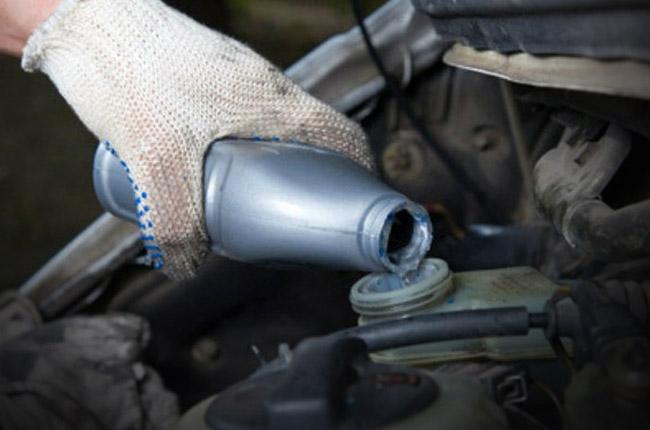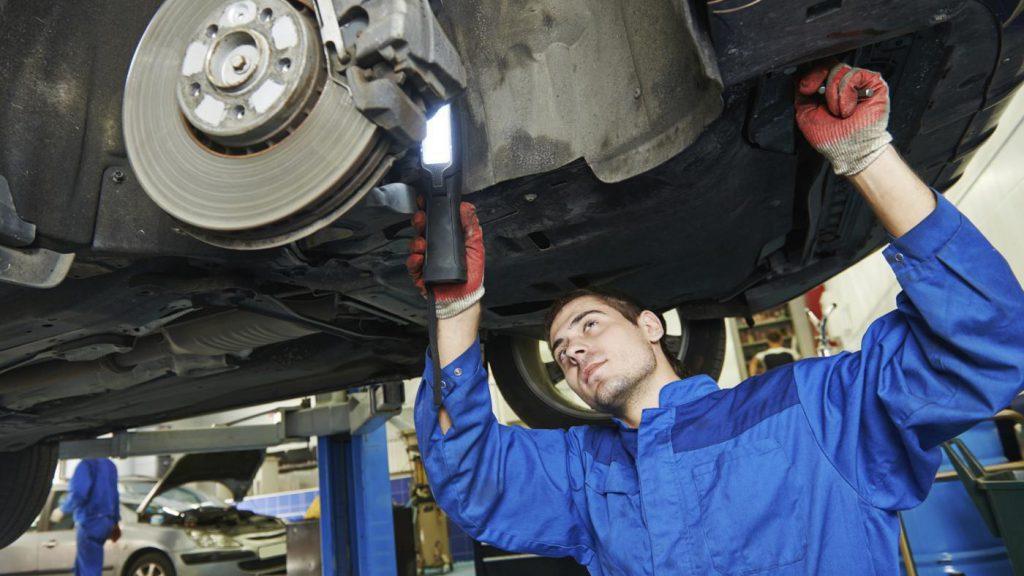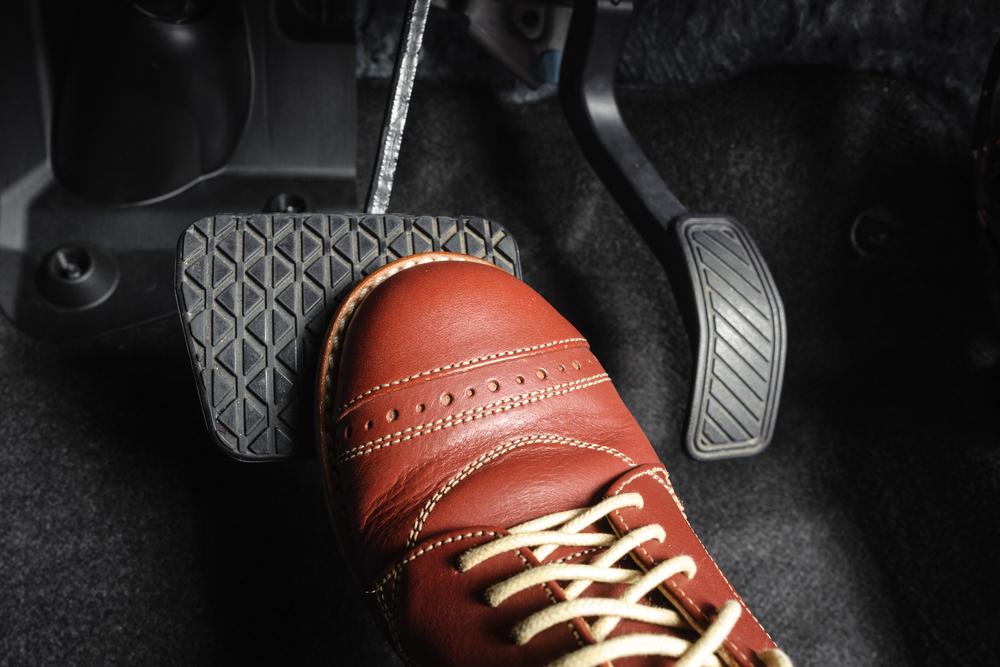In reality, a working brake pedal will feel firm under your foot when you press it. The term mushy or spongy brakes indicate the condition when the brake pedal loses that firmness and the brakes don’t feel stable.
Such a soft brake pedal problem can occur due to various reasons such as air in the line, holes in the brake lines, or worn calipers. If the brakes feel spongy, you should immediately have the car’s braking system diagnosed and take necessary actions because it creates a potentially unsafe condition when you are driving.
What Causes Spongy Brakes?
There could be many reasons for squishy brakes. Learn what causes spongy brakes and how we can help solve it.
1. Leak in the brake lines
Rust from road salt and moisture can corrode a brake and create holes causing the internal fluid to leak out of the line. If such a thing happens, the fluid level will get lower, resulting in a loss of hydraulic pressure. If your brakes feel soft, check the lines and replace them as soon as possible if you find any leak which usually leads to spongy brakes. In case you find a leak, you should replace the brake line as soon as possible.

Read more:
2. The brake fluid level
If the level of the brake fluid is low or drained up, it can make the spongy brakes. Open your car’s hood and remove the cap from the brake’s master cylinder. Now, check the fluid level. If the level is low, refill and recheck the brakes.
3. Air in the brake line
It’s the most common spongy brakes cause. To bring vehicles to a halt, braking systems depend on evenly distributed hydraulic pressure. The brake lines of the car should have only the brake fluid. However, because the air gets into the lines, it hampers the flow of the liquid, which can cause mushy brakes. Bleeding the brakes is the only solution to get rid of that air.
4. Corroded disc brake calipers
Just like the brake lines, the disc brake calipers can also collect rust and get corroded. The brake fluid can leak through the damaged spots, causing the loss of hydraulic pressure. If your brakes are feeling soft lately, you should check the calipers.
5. Bad wheel cylinder
Any problem in the wheel cylinder should be given utmost importance because it may require you to change some brake components. A bad wheel cylinder is another cause of soft brake pedal. Rust can corrode it and create holes for brake fluid to come out. As you already know, the loss of brake fluid results in the loss of hydraulic pressure, which in turn, causes the spongy brake problem.
6. Adjustment of rear brake shoes
The rear shoes are not being adjusted as they wear if the pumping of the brake pedal in your vehicle improves the brake pedal. Shoes should be checked for wear and adjusted as needed. You should use the parking brake occasionally. The engagement of the parking brake leads to an automatic adjustment of the brake shoes.
7. Worn brake pads
Remove the front and rear wheels to inspect if there’s excessive wear on the brake pads. The sad news is, that brake pads are the car parts that are responsible for the whole braking system. It helps the car to stop instantly while you press the brakes. For that reason, it is necessary to replace them if they look extremely worn out for your safety.

3 Symptoms Of Spongy Brakes
Brake warning light is on
When the warning brake light is on your vehicle’s dashboard, it’s a sign to tell you that there’s a problem with the brake system and that you must take timely action. While spongy brakes can be a potential problem with the braking system, the warning brake light is a general indicator that something is wrong and requires attention.
Poor brake performance
We think this is the most obvious symptom when your car brakes are spongy. The vehicle takes longer to stop or requires more distance to come to a complete halt. You may also experience a decrease in overall braking power.
Brake fade
This sign seems strange but it’s also one of the most common symptoms of spongy brakes. If the brake pedal becomes spongy after repeated or prolonged braking, it could indicate brake fade. Brake fade occurs when the brake system overheats, resulting in reduced braking efficiency.
How To Fix Spongy Brake
If you experience a squishy brake, it is recommended that you should have your car inspected by the mechanic as soon as possible. In another case, you can apply these tips for addressing a spongy brake as safely as possible.
1. Pump the pedal
Because a loss of brake pressure or other causes drive the brake to be spongy, your first reaction should be to rapidly and constantly pump the brake pedal with your foot. Even if there is a defect in your braking system, this can usually generate enough pressure to stop safely on the side of the road. Additionally, check out all maintenance tips from our experts for more information on dealing with soft brakes and routine maintenance and repairs.
2. Look for a leak then fix it
Check signs of leaking fluid in the area behind each of your car’s wheels. Also, you should look under your hood to see if your master cylinder is leaking or damp. Then, check the master cylinder to see if it’s filled up to the indicator line on the side of the reservoir. If the fluid is low, try adding some and pumping the pedal to regain pressure in the system. Any leaking brake fluid represents a problem that you should send your vehicle for repair.
3. Bleed your brakes
Another method is bleeding your brakes to remove excess air that might have entered into the system. If you have overheated your brakes during spirited driving or towing, the fluid can boil and create gas that will make your pedal feel spongy which is because gas is compressed, unlike fluid. Each of your brake calipers or brake drum wheel cylinders will have a bleeding screw that will allow you to force air out of the lines using the brake pedal and the proper bleeding procedure for your vehicle. You can see this video to learn more about how to fix the soft brake pedal with a bleeding system.
Conclusion
Any problem with the brakes can cause minor to major accidents on the road. So, if you feel your brakes are not as firm as they should be, check the brake system immediately to find out the source of the problem.




Brake loses pressure once in a while but fluid level remains at full mark. Any suggestions on how to solve this problem?
Thanks for mentioning that your car might be leaking brake fluid if you notice any puddles or liquids behind your car’s wheels. My uncle’s driveway has four strange puddles of fluid whenever he parks his car for a long period of time, I am starting to worry that there might be some kind of leak. It may be a good idea for him to look for an auto repair service that can make sure that his vehicle isn’t leaking brake fluid.